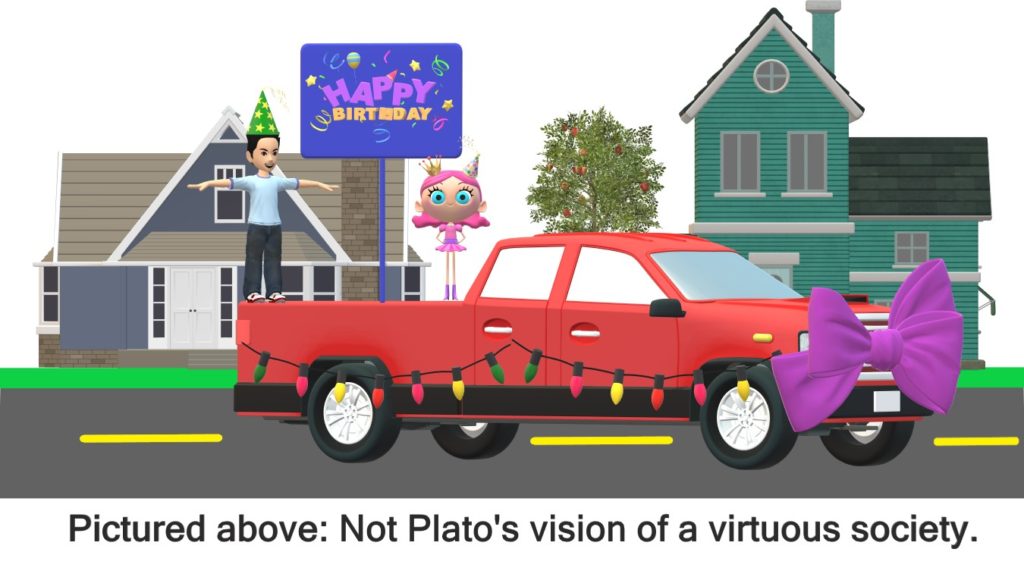Drive-By Birthdays: Now I’ve Heard It All
Of all the frivolous, unnecessary nonsense going on in the world, this takes the cake.
Written by William Urbanski.
When I recently read the North American headlines that mentioned “drive-bys” and “children” in the same sentence, I was bracing myself for yet another story about a community ensnarled by gang violence. The reality was much, much worse. Although thankfully there have been no reported cases of this phenomenon in Korea quite yet, it seems that an unfortunate by-product of the ongoing COVID-19 pandemic in North America has been the ludicrous, energy-profligate, and blatantly ridiculous practice of “drive-by birthdays.” While I have seen and heard a lot of things in my day that make me question the collective IQs of entire nations, this one breaks new ground. Any individual who has participated in a drive-by birthday should take a close and honest look at his or her decision-making process because this whole practice is seriously wack.
The drive-by birthday is a solution to the non-problem of children who otherwise would not get to have birthday parties because of the common-sense rules in place to contain the spread of COVID-19. Since inviting a bunch of germ-covered kids over to the birthday boy’s or girl’s house to run amok and sneeze on each other until it is time for them to shove chocolate cake in their faces with their bare hands is not an option, and since the parents of said birthday boy or girl cannot just, you know, cancel the party, they devised a “solution” whereby parents slowly drive by the house while their obnoxious kids scream happy birthday at the top of their lungs and hold up signs from the back seat. It seems that drive-by birthdays are some parents’ way of declaring to the world that they will not let a global pandemic that has killed thousands stop them from throwing a birthday party. Well, here is the problem with that line of reasoning: Anyone with a functioning brain between their ears should let the coronavirus stop them from doing all sorts of stuff.
The Herculean logistical effort required to coordinate one of these poor excuses for a parade would be appropriate for someone generally going through a tough time, like a child with a terminal disease. But the kids in question are neither particularly special nor noteworthy, nor celebrating huge milestones – it is just another birthday. Obviously, the coronavirus is not stopping any family from acknowledging the day a kid was born. It is just the outward, showy party aspect that has to be indefinitely postponed – and that is what the bad parents just cannot seem to let go of. Birthdays have two parts: the recognition of the date of one’s birth and the cultural tradition of getting together with a bunch of people. The former lends itself to a quiet and dignified get-together of close family. The latter – the “birthday bash” – is superfluous. And, much like Christmas, which has its origins in some baby being born two millennia ago, birthdays have become obfuscated with virtually compulsory and excessive shopping, and as people get older, with regrettable nights in the club.
Fairness vs. Generosity
Purportedly, the motivation for going through with this emerging and foolish practice has its roots in a subconscious statistical comparison of costs and benefits: The inconvenience of organizing a drive-by party is less than the pain it would cause the parents to listen to their screamy, spoiled kid whine about missing a birthday. So this “grand bargain,” as it were, alludes to the great tragedy of this whole situation: that it is a missed teaching opportunity. Any child who must have a party cancelled will probably make the outlandish claim that “it’s not fair.” Well, by definition, cancelling a non-mandatory gathering of a bunch of kids in an enclosed place, among a plethora of event cancellations around the globe in place to prevent the spread of a communicable disease, is extremely fair. So, the proper course of action would be to sit down with the birthday child and explain exactly what is going on and how not having a birthday is actually a good and compassionate precaution to take – end of story. It would also be a good opportunity to explain that while people are under a social obligation to be fair (for better or worse), they are under no obligation to be generous, which is what birthday parties are all about: compulsive generosity. Suggesting that people must be generous (i.e., that kids must provide birthday gifts) is ridiculous. If there are two people and one sandwich, each person getting half is fair. If one person thinks that on his birthday, he is entitled to the whole sandwich, then that person was not raised properly.
Sweet 16
Back in the early 2000s, there was an amazing show on MTV called My Super Sweet 16, which profiled snotty rich girls as their parents bent over backwards and dropped serious coin trying to throw them the ultimate birthday bash. Every conceivable stereotype of a haughty-taughty, spoiled, ungrateful, all-around dumpster fire of a soon-to-be-sixteen-year-old brat played out on the screen. While amusing, some of the episodes were hard to watch, such as when these little princesses whined and literally cried because the musicians hired to perform at their parties were not famous enough. My personal theory about why this show enjoyed such enormous (albeit ephemeral) popularity, is that watching it acted as a kind of catharsis to the viewing masses who were able to say “well, at least my kid isn’t that spoiled”. So, in a sense, My Super Sweet 16 enjoyed success for the same reason that World Wrestling Entertainment has continued to sap the intellects of every city it has visited for nearly 40 years – it is an outlet for emotions that we are normally taught to suppress. Furthermore, part of the enjoyment of these shows is the juxtaposition they create between values and attitudes that are worthy of praise and those, such as greed and entitlement, that invite ridicule and scorn.
Plato and the Virtuous Society Now, admittedly, I am paraphrasing a bit here, but Plato postulated that the ultimate goal of democracy, and the purpose of society in general, is not to let a bunch of kids play Pin the Tail on the Donkey and hit a piñata once a year. It is to cultivate virtuous citizens: those that understand virtues and adhere to them, thereby making society as a whole better. Entitlement is not a virtue, and by implicitly teaching kids that it is okay to bend basic safety rules to party down, we should really wonder what values we are instilling in them. Now, all this might be a little over the heads of little Johnny or Jenny who is crying the blues about a cancelled birthday, so let us leave it at this: No kid has a moral right to a birthday party. While it is easy (and fun) to point the finger at children, let’s not forget that 99.99 percent of kids are too busy playing in the mud and/or lack the executive function to orchestrate any sort of party, especially one requiring a procession of vehicles. This inconvenient truth points to the explicit involvement of the parents, which is the other thing drive-by birthdays are about anyway. Parents organize these things so that they can record them, make a terrible video, upload it onto Facebook, count how many likes they get, then pat themselves on the back for what a good job they have been doing.

A Message Through Time
We have been talking a lot about the bad precedent drive-by birthdays set for kids, but let us think for a moment about the ridiculous messages we are sending into the future because, make no mistake, anthropologists five hundred years from now will look back on this in bewildered amusement. They will, without question, and rightfully so, relentlessly and mercilessly mock any parent who caved in to their child’s temper tantrums and organized one of these shindigs. The archeologists and anthropologists of the year 2520 will be forced to conclude that what we, as a society, deemed to be supremely important in life was to bust our humps working jobs we do not like so that we can waste time, money, and gas putting on ridiculous parades for our spoiled kids.It is understandable that children will get upset because they cannot have a birthday party, but given the current circumstances, I say, let them eat cake.
THE AUTHOR
William Urbanski, managing editor of the Gwangju News, has an MA in international relations and cultural diplomacy. He is married to a wonderful Korean woman, always pays cash, and keeps all his receipts. Instagram: @will_il_gatto.







